

China's push to control Americans' health care future - 60 Minutes. For all the polarization that grips Washington, here's a source of rare consensus: the emerging threat of China's push to acquire our health care data, including the DNA of American citizens.
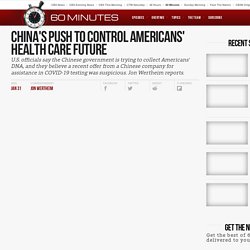
U.S. officials tell us the communist regime's aggressive collection of our most personal information presents a danger both to national security and our economy. As alarm bells ring across agencies, parties, and presidential administrations, different branches of government have taken action over the past year to stem the tide of our medical data flowing to China. For poorer countries, road to coronavirus vaccines far longer than the West. With Americans, Britons and Canadians rolling up their sleeves to receive coronavirus vaccines, the route out of the pandemic now seems clear to many in the West, even if the rollout will take many months.
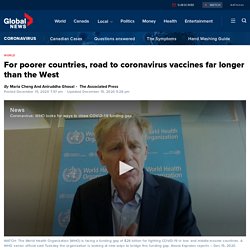
But for poorer countries, the road will be far longer and rougher. The ambitious initiative known as COVAX created to ensure the entire world has access to COVID-19 vaccines has secured only a fraction of the 2 billion doses it hopes to buy over the next year, has yet to confirm any actual deals to ship out vaccines and is short on cash. The virus that has killed more than 1.6 million people has exposed vast inequities between countries, as fragile health systems and smaller economies were often hit harder. COVAX was set up by the World Health Organization, vaccines alliance GAVI and CEPI, a global coalition to fight epidemics, to avoid the international stampede for vaccines that has accompanied past outbreaks and would reinforce those imbalances. Story continues below advertisement. Covid vaccine: WHO warns of 'catastrophic moral failure' Vaccine makers race to secure supply chains. The coronavirus pandemic 'Great Reset' theory and a false vaccine claim debunked.
OECD. Here’s one way to make daily covid-19 testing feasible on a mass scale. It’s impossible to contain covid-19 without knowing who’s infected: until a safe and effective vaccine is widely available, stopping transmission is the name of the game.

While testing capacity has increased, it’s nowhere near what’s needed to screen patients without symptoms, who account for nearly half of the virus’s transmission. Our research points to a compelling opportunity for data science to effectively multiply today’s testing capacity: if we combine machine learning with test pooling, large populations can be tested weekly or even daily, for as low as $3 to $5 per person per day.
In other words, for the price per test of a cup of coffee, governments can safely reopen the economy and halt ongoing covid-19 transmission—all without building new labs and without new drugs or vaccines. Most people get tested for the coronavirus because they experienced symptoms, or came in close contact with someone who did. CEO’s guide to COVID-19: Restarting after the crisis. As governments in Europe announce plans to end the lockdown, a new phase in the COVID-19 pandemic is upon us.
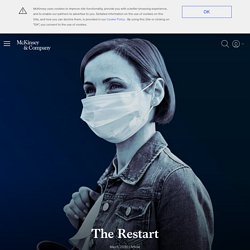
It is a time for hope but also for caution. The end of the lockdown will not spell a return to the old “normal”, nor will it be universal. The opening will take different shapes, with different countries, different regions, and different business sectors opening up in different ways and at differing speeds. ‘Zoom fatigue’ is taxing the brain. Here's why that happens. Jodi Eichler-Levine finished teaching a class over Zoom on April 15, and she immediately fell asleep in the guest bedroom doubling as her office.

The religion studies professor at Lehigh University in Pennsylvania says that while teaching is always exhausting, she has never “conked out” like that before. Until recently, Eichler-Levine was leading live classes full of people whose emotions she could easily gauge, even as they navigated difficult topics—such as slavery and the Holocaust—that demand a high level of conversational nuance and empathy. Now, like countless people around the world, the COVID-19 pandemic has thrust her life into a virtual space. In addition to teaching remotely, she’s been attending a weekly department happy hour, an arts-and-crafts night with friends, and a Passover seder—all over the videoconferencing app Zoom. The experience is taking a toll. New Covid-19 Antibody Study Results Are In. Are They Right? The Cure May Be Deadlier Than the Disease. Much Deadlier. Jonathan Rose is William R.
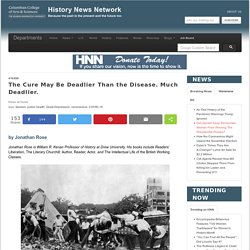
Kenan Professor of History at Drew University. His books include Readers’ Liberation, The Literary Churchill: Author, Reader, Actor, and The Intellectual Life of the British Working Classes. In the midst of the COVID-19 epidemic, we are being urged by governments and the media to “trust the experts” – that is, public health officials. It sounds straightforward and obvious, but historians are experts too. Of course our expertise is different, but what it tells us, and what we should communicate to the public, is that “trusting the experts” isn’t nearly as simple as it may seem.
Rolls-Royce launches COVID-19 data alliance to aid economic recovery – Government & civil service news. The International Monetary Fund expects the world economy to shrink at its fastest pace in decades, raising fears the COVID-19 pandemic could trigger the worst recession since the 1930s Great Depression.
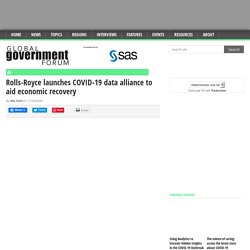
(Photo by Rafael Matsunaga via flickr). Luxury car manufacturer Rolls-Royce has established a data alliance formed of tech companies and data analytics experts that aims to help governments and businesses find new ways to mitigate the impact of coronavirus on the global economy. The alliance, called Emer2gent, is formed of an initial group of seven companies and institutions including IBM, Google Cloud and the Leeds Institute for Data Analytics. How the Economy Will Look After the Coronavirus Pandemic. After many weeks of lockdowns, tragic loss of life, and the shuttering of much of the global economy, radical uncertainty is still the best way to describe this historical moment.
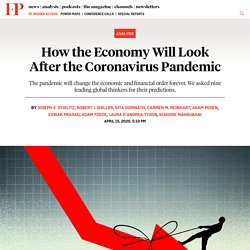
Will businesses reopen and jobs come back? Will we travel again? ARC - Google Slides. 86d0f5 368d1201d81e4e83a3b9b0be3e5f1596. ARC - Google Slides. 86d0f5 368d1201d81e4e83a3b9b0be3e5f1596. There will be no 'back to normal' The pandemic will change the world permanently and profoundly.
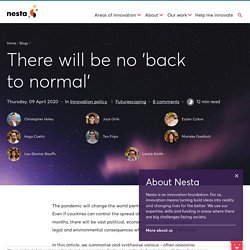
Even if countries can control the spread of COVID-19 in the coming months, there will be vast political, economic, social, technological, legal and environmental consequences which will last many decades. In this article, we summarise and synthesise various - often opposing - views about how the world might change. Clearly, these are speculative; no-one knows what the future will look like. But we do know that crises invariably prompt deep and unexpected shifts, so that those anticipating a return to pre-pandemic normality may be shocked to find that many of the previous systems, structures, norms and jobs have disappeared and will not return.
For this reason, adaptation and innovation are more important than ever. Coronavirus Will Change the World Permanently. Here’s How. Revived trust in institutions.Michiko Kakutani is author of the 2018 bestseller The Death of Truth and former chief book critic of the New York Times.
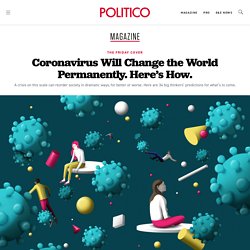
The coronavirus pandemic, one hopes, will jolt Americans into a realization that the institutions and values Donald Trump has spent his presidency assailing are essential to the functioning of a democracy—and to its ability to grapple effectively with a national crisis. A recognition that government institutions—including those entrusted with protecting our health, preserving our liberties and overseeing our national security—need to be staffed with experts (not political loyalists), that decisions need to be made through a reasoned policy process and predicated on evidence-based science and historical and geopolitical knowledge (not on Trump-ian “alternative facts,” political expediency or what Thomas Pynchon called, in Gravity’s Rainbow, “a chaos of peeves, whims, hallucinations and all-round assholery”). Fast forward to 2020.
How the Economy Will Look After the Coronavirus Pandemic. ARC - Google Slides. Impact of COVID-19 on insurers. COVID-19 is impacting the insurance industry in multiple ways—from employee and business continuity issues to client service considerations to the financial outlook. Here are some key issues insurers face and potential action steps they could take. How COVID-19 Could Ruin Weather Forecasts and Climate Records. Twice per year, Ed Dever’s group at Oregon State University in Corvallis heads out to sea off the Oregon and Washington coasts to refurbish and clean more than 100 delicate sensors that make up one segment of a US$44-million-per-year scientific network called the Ocean Observatories Initiative.
“If this had been a normal year, I would have been at sea right now,” he says. Instead, Dever is one of many scientists sidelined by the coronavirus pandemic, watching from afar as precious field data disappear and instruments degrade. 86d0f5 368d1201d81e4e83a3b9b0be3e5f1596. India launches apps to track corona cases and tackle misinformation – Government & civil service news. A local artist has created the ‘corona helmet’ used by Indian police to spread awareness of the severity of the coronavirus pandemic. (Photo by Shantanu Dutta via flickr). The Indian government has launched a coronavirus tracking app, two weeks after it created a WhatsApp chatbot – designed to provide citizens with information about the pandemic – which has so far been used by 20 million people.
The new tracking app, called Aarogya Setu – which translates as ‘a bridge of health’ – has been launched by the Ministry of Electronics and Information Technology and created in partnership with private sector companies. The Artificial Intelligence system behind it uses app users’ mobile phone location and Bluetooth data to assess whether they’ve been within six feet of a person infected with COVID-19. The Asian Countries That Beat Covid-19 Have to Do It Again. Ontario could see up to 15,000 deaths from COVID-19, health officials warn. Ontario could see 3,000 to 15,000 deaths over the next two years from the COVID-19 pandemic if the province maintains its public health measures, health officials said Friday.
Ontario health officials released projections that also showed that without the closings and restrictions brought in in recent weeks, the province could have faced 100,000 deaths. The numbers show officials are expecting 80,000 cases of COVID-19 and 1,600 deaths in just the month of April. That’s well below the 300,000 infections they say would have swamped the health care system in the absence of the province’s current closings and physical distancing measures. Projected Ontario cases by April 30. Coronavirus Will Change the World Permanently. Here’s How. The shocking coronavirus study that rocked the UK and US. An Imperial College coronavirus model has had a profound impact on public policy since its results were shared with British and American officials last week. No study has so exhaustively detailed the transmission of the virus through the UK and US population, the overwhelming pressure it has placed on health systems, or the limited effectiveness of individual measures to check its progress.
Like any simulation, it rests on uncertain assumptions. Many factors remain unknown to the research team led by Professor Neil Ferguson, who this week fell ill with coronavirus symptoms. But even with this caveat the conclusions are brutally stark: democratic politicians face only terrible choices in the battle to save lives. The starting point for analysis is an unchecked epidemic. While the estimate draws on hospitalisation rates in Italy, it assumes every patient receives adequate care. The mortality peak would occur after about three months. Britain and America started with mitigation measures. Former world leaders call for G20 to coordinate corona response – Government & civil service news. G20 leaders at the Osaka Summit in 2019. China’s Economy Shrinks, Ending a Nearly Half-Century of Growth. Ontario could see up to 15,000 deaths from COVID-19, health officials warn. Coronavirus Will Change the World Permanently. Here’s How. Opinion: Five lasting implications of COVID-19 for Canada and the world.
Myth busters. 20200324 sitrep 64 covid 19. Coronavirus May Disrupt the 2020 Election. We Need a Plan. Wuhan whistle-blower doctors warn of deadlier Covid-19 reinfection.